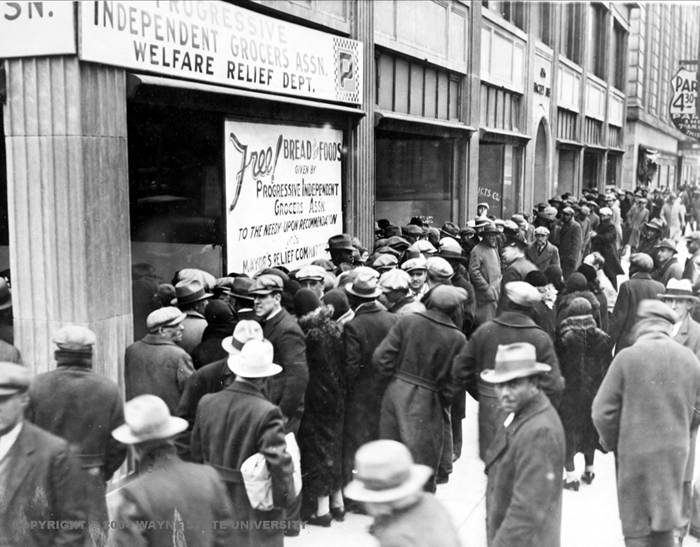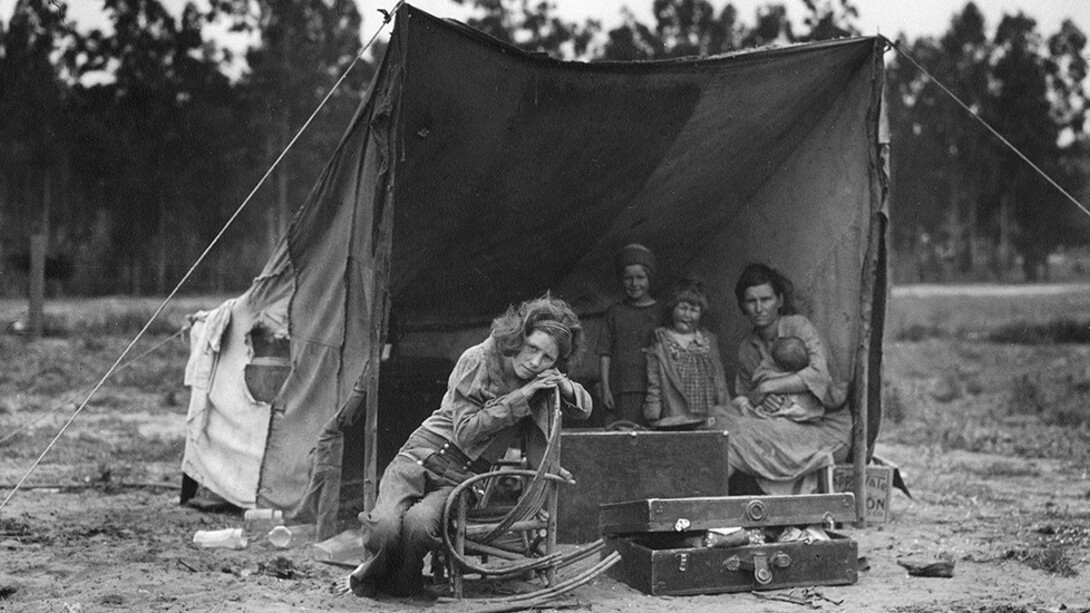Welcome to DU!
The truly grassroots left-of-center political community where regular people, not algorithms, drive the discussions and set the standards.
Join the community:
Create a free account
Support DU (and get rid of ads!):
Become a Star Member
Latest Breaking News
General Discussion
The DU Lounge
All Forums
Issue Forums
Culture Forums
Alliance Forums
Region Forums
Support Forums
Help & Search
Video & Multimedia
Related: About this forumFDR's First 100 DAYS And NEW DEAL, The Great Depression
Last edited Sun Feb 24, 2019, 02:31 AM - Edit history (4)
On Inauguration Day, March 4, 1933 nearly one fourth of the American workforce was unemployed. In the cities, jobless men were lining up for soup and bread. In rural areas, farmers whose land was being foreclosed were talking openly of revolution. The crowd that gathered in front of the US Capitol that day to watch Franklin D. Roosevelt's Inauguration had all but given up on America.
But Roosevelt's Inaugural Address was a pitch-perfect combination of optimism ('The only thing we have to fear is fear itself'), consolation (the nation's problems 'concern, thank God, only material things') and resolve ('This nation asks for action, and action now'). The speech won rave reviews. FDR had buoyed the spirits of the American people- and nearly 500,000 of them wrote to him at the White House in the following week to tell him so.
Just hours after the Inauguration, Roosevelt made history in a more behind-the-scenes way. He gathered his Cabinet in the White House and had Justice Cardozo swear them in as a group which was a first. The team came through brilliantly- in the next 100 days, FDR's Administration shepherded 15 major bills through Congress. It was the most intense period of lawmaking ever undertaken by Congress- a "presidential barrage of ideas and programs." FDR took the country in a whole new direction. His predecessor, Herbert Hoover, the third in a succession of GOP presidents- Harding, Coolidge and Hoover (1921-1933) had believed in small government and letting the free market operate.

-> Did you know? Unemployment levels in some cities reached staggering levels during the Great Depression:
By 1933, Toledo, Ohio's had reached 80 %, and nearly 90 % of Lowell, Massachusetts, was unemployed. <-
Even as the U.S. endured the worst depression in its history, Hoover had argued that the answers lay in unfettered capitalism and private charity. Roosevelt, by contrast, insisted that when people could not help themselves, government had to step in, "not as a matter of charity but as a matter of social duty." Roosevelt promised Americans a New Deal.
At heart, he was a pragmatist, not an ideologue. During the campaign, he vowed to respond to the Depression with "bold, persistent experimentation." He was open to any ideas that might work.
Frances Perkins, his Secretary of Labor and the first female Cabinet member, pushed for large-scale welfare and public-works programs. Families that fell behind on rent were being thrown out on the street, children were keeling over in school from malnutrition, and people were foraging for food in garbage dumps. FDR backed a welfare program drawn up by energetic leader Harry Hopkins, a social worker who became the first federal welfare administrator.

- President Roosevelt greets enthusiastic supporters in Warm Springs, Ga. on Dec. 1, 1933.
The initial public-works program was one Roosevelt thought up himself: the CCC- Civilian Conservation Corps, which hired more than 250,000 young people to plant trees and fix up national parks. Later in the Hundred Days, FDR signed on to a much larger plan. It allocated $3.3 billion to put unemployed people to work in an array of government jobs across the country. This plan later grew into the WPA- Works Progress Administration, the New Deal's signature jobs program.
FDR also imposed the first federal regulations on the stock market. Many Americans believed Wall Street chicanery had caused the Depression. The Truth-in-Securities Act required issuers of new securities to disclose important information.
A second banking law, the Glass-Steagall Act, separated investment banking and savings banking.
In little more than three months, Roosevelt had done nothing less than create a new America. The Hundred Days was the start of the American welfare state. For the first time, the Federal Government assumed responsibility for caring for its worst-off citizens. It was the start of Social Security and unemployment insurance which became law in 1935 and, much later, for programs like Medicare and Medicaid.
The Hundred Days also laid the groundwork for the modern regulatory state. FDR created the SEC- Securities and Exchange Commission. Before the New Deal ended, there would be a federal minimum wage and a National Labor Relations Board to protect the rights of workers. FDR's programs aimed to restore some dignity and prosperity to many Americans and his New Deal fundamentally and permanently changed the federal government’s relationship to U.S. citizens.
Not all the Hundred Days legislation has survived. The federal welfare program was dismantled in the 1990s, during the Gingrich revolution, and turned into block grants to the states...
MORE, "The First 100 Days," TIME, 2009, http://content.time.com/time/specials/packages/article/0,28804,1906802_1906838_1906979-2,00.html
https://www.history.com/topics/great-depression/new-deal
InfoView thread info, including edit history
TrashPut this thread in your Trash Can (My DU » Trash Can)
BookmarkAdd this thread to your Bookmarks (My DU » Bookmarks)
9 replies, 2061 views
ShareGet links to this post and/or share on social media
AlertAlert this post for a rule violation
PowersThere are no powers you can use on this post
EditCannot edit other people's posts
ReplyReply to this post
EditCannot edit other people's posts
Rec (18)
ReplyReply to this post
9 replies
 = new reply since forum marked as read
Highlight:
NoneDon't highlight anything
5 newestHighlight 5 most recent replies
= new reply since forum marked as read
Highlight:
NoneDon't highlight anything
5 newestHighlight 5 most recent replies
FDR's First 100 DAYS And NEW DEAL, The Great Depression (Original Post)
appalachiablue
Feb 2019
OP
dweller
(23,651 posts)1. this needs pinned to the Greatest Page
for all eyes to see
mandatory reading, Steinbeck's GRAPES OF WRATH
test on Tuesday, every 2 and 4 years...
✌🏼️
appalachiablue
(41,170 posts)2. So important to know this history, from literature
like John Steinbeck's realist 1939 Pulitzer prize novel, 'The Grapes of Wrath,' dramatized in 1940 as a motion picture. And from 1930s Depression- era images by photojournalist Dorothea Lange.

Iconic 1930s, Depression period 'Migrant Mother,' California 1936, by Dorothea Lange.
https://artsandculture.google.com/theme/UgKSzBM63VVaJw
![]()

crazytown
(7,277 posts)3. Best New Deal Video
Amazing shots of Great Depression Poverty. Contempary coverage of the NRA and WPA.
appalachiablue
(41,170 posts)8. Vy good, thanks for posting, I selected a shorter video cuz of time.
appalachiablue
(41,170 posts)4. BEFORE FDR BECAME PRESIDENT IN MARCH 1933:
"Happy Days Are Here Again" FDR's 1932 presidential campaign song launched at the Democratic Convention.
Franklin Roosevelt's selection of the sunny Happy Days Are Here Again debuted at the 1932 Democratic Convention — by accident. Judge John E. Mack, the man who introduced Roosevelt, delivered a bland clunker of a speech and walked off stage to the originally chosen song, Anchors Aweigh. Roosevelt's political advisors were so upset by the awful performance that they demanded a new song be played before the candidate's speech.
They selected Happy Days Are Here Again, from the 1930 musical Chasing Rainbows, making Roosevelt the first President to pick a pre-existing song for his campaign and handing the Democratic Party their unofficial theme song for years to come. http://content.time.com/time/specials/packages/article/0,28804,1840981_1840998_1840901,00.html

Jeffersons Ghost
(15,235 posts)5. K&R w/ FDR speech
appalachiablue
(41,170 posts)9. Thanks for posting. Major intellect, courage and articulate speaker
to lead the country through that dark time.
PatSeg
(47,577 posts)6. K&R to watch/read later
AwakeAtLast
(14,133 posts)7. And his service as President was ended by Congress.
Once again, Republicans grabbing power as they see fit.